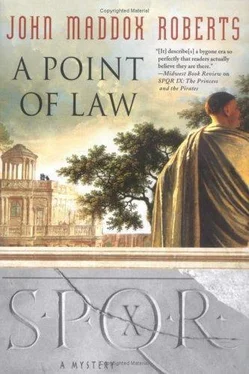John Roberts - A Point of Law
Здесь есть возможность читать онлайн «John Roberts - A Point of Law» весь текст электронной книги совершенно бесплатно (целиком полную версию без сокращений). В некоторых случаях можно слушать аудио, скачать через торрент в формате fb2 и присутствует краткое содержание. Год выпуска: 0101, ISBN: 0101, Издательство: St. Martin, Жанр: Исторический детектив, на английском языке. Описание произведения, (предисловие) а так же отзывы посетителей доступны на портале библиотеки ЛибКат.
- Название:A Point of Law
- Автор:
- Издательство:St. Martin
- Жанр:
- Год:0101
- ISBN:9780312337254
- Рейтинг книги:5 / 5. Голосов: 1
-
Избранное:Добавить в избранное
- Отзывы:
-
Ваша оценка:
- 100
- 1
- 2
- 3
- 4
- 5
A Point of Law: краткое содержание, описание и аннотация
Предлагаем к чтению аннотацию, описание, краткое содержание или предисловие (зависит от того, что написал сам автор книги «A Point of Law»). Если вы не нашли необходимую информацию о книге — напишите в комментариях, мы постараемся отыскать её.
A Point of Law — читать онлайн бесплатно полную книгу (весь текст) целиком
Ниже представлен текст книги, разбитый по страницам. Система сохранения места последней прочитанной страницы, позволяет с удобством читать онлайн бесплатно книгу «A Point of Law», без необходимости каждый раз заново искать на чём Вы остановились. Поставьте закладку, и сможете в любой момент перейти на страницу, на которой закончили чтение.
Интервал:
Закладка:
“As it occurs, Aristobulus reclined to my immediate left during that banquet, and I was able to examine the ring closely. It was of massive gold and had an exotic, finely granulated surface. It was set with a handsome sapphire. I have spent much of my life in Egypt, and I know Egyptian stone when I see it. It was carved intaglio with a gorgoneion .”
This was more than I had expected. “Did he say anything else? Anything that might identify his patron or the business they had together?”
“Nothing definite,” Asklepiodes said. “And you must remember that I was not giving this matter any special attention. I was far more involved with my more congenial friends. I do remember that he hinted his patron was a powerful Roman, not a Greek, and that the man was interested in ‘the truly important things,’ by which I presume he meant the arcane field of mathematics that consumed him.”
“If so,” I said, “he was flattering himself. Philosophers are prone to do that in my experience. His patron was interested in one thing only: an unbreakable cipher he could use to keep secret his doings and those of his coconspirators. Aristobulus’s absurd ‘symbol for nothing’ was used for no greater purpose than separating the words in a text. He might as well have simply left a space between the words.”
“That might have made the code easier to break,” Asklepiodes pointed out. “As it is, a mind less penetrating than Callista’s might never have divined the implication. Then the code would have been truly incomprehensible.”
“I suppose so. Anyway, how did the man come to be murdered?”
“When I accompanied the troupe to Croton two months ago, I attended the club dinner as usual. Aristobulus had never been my favorite among that company so it was only after the dinner and well into the drinking bout that I noticed he was not there. I asked where he might be, and the others said he had been murdered and were surprised that I had not known about it. Apparently the killing gained some degree of notoriety in the southern part of the peninsula.
“In any case, it seems that Aristobulus had left on a rather sudden trip to Baiae-”
“Baiae!” I cried triumphantly.
“Yes, I thought that would get your attention.”
“You have it already! Go on!”
“Calm yourself, my friend. Unrequitable passion has a deleterious effect on the bodily humors. He must have completed his journey to Baiae because he was on the road south, returning to Croton, when he was fallen upon and slain,” Asklepiodes said.
“ ‘Fallen upon’?”
“Yes, it appeared to be the work of bandits. They’ve become rare in the vicinity of Rome, but southern Italy is infested with them.”
“It always has been. Southern Italy is more like Africa than civilized Latium.” I wasn’t being quite fair to our southern brethren. Southern Italy was full of desperate, dangerous men because the peasants of that region were the most thoroughly ruined in the peninsula. The entirety of the land south of Capua and the whole island of Sicily had been turned into latifundia. Land that had supported thousands of peasant families had been converted into a few vast plantations worked by cheap slaves, leaving the dispossessed farmers to fend for themselves.
“So,” I went on, “how is it that the murder was attributed to bandits? I don’t suppose anyone came forward to confess?”
“Of course not. When does anyone confess to a crime save under torture or when caught in the act? But, according to those who found his body, it bore all the signs of a bandit attack: He was discovered stripped to the skin, even his sandals taken. Also missing was the hired donkey he had been riding.”
“How was he dispatched?”
“Stabbed through the body. That is all I know of his fatal wound. Had I been able to examine the corpse, I might have discovered many revealing details. But he had been cremated more than a month prior to my visit. Apparently, it never occurred to the authorities to inquire into the incident. Bandit attacks are so common in the region that they saw no reason for an investigation.”
“And he was traveling alone? Not even a slave or two?”
“Apparently. As a penurious man of simple habits, he had only a rather elderly housekeeper.”
I mused for a while, studying the weapons on the wall. “Stabbed, eh? And through the body? Bandits usually favor a club to subdue their prey. It gets less blood on the clothes.”
“They might have forced him to strip before giving him his passage on the ferryboat.”
“Then why not cut his throat? It is the swiftest and surest method for dispatching a man with a knife. I’ll tell you why: These people can’t shake off their aristocratic habits. They want to make it look like bandits did it, but they have to stab their victim from in front, like gentlemen.”
“A strange sort of oversight, one would think,” Asklepiodes commented.
“They intend never to be called to account for their crimes,” I said. “It is to maintain their own good opinion of themselves and each other that they commit murder as if they were soldiers striking down an enemy. Doubtless these men tell each other that they are acting out of patriotic motives.”
“ ‘Patriotic’?” Asklepiodes gestured with his beautifully manicured hands like an actor in a comedy who is at his wit’s end. “But this is so puzzling. Not only killing a very obscure Greek philosopher from patriotic motives but constructing so elaborate a conspiracy to prevent one man from attaining the office of praetor. I hope you are not offended that I wonder at this.”
“Oh, I’m under no such delusion. I am just the immediate and rather a minor target, I’m afraid. These men have designs on the whole Republic.”
“Ah,” he said, with satisfaction. “That is on a scale rather more grand. To my poor mind, though, the details remain wreathed in obscurity.”
“They are not very plain to me either, but I think I am beginning to see where this is all headed. Three men named Claudius Marcellus, two brothers and a cousin, are pushing us toward civil war. One of them is this year’s consul, another will be next year’s, the third will very likely be consul the year after. They are doing everything in their power to turn the whole Senate against Caesar. This is a plot made simpler by the fact that Caesar does so little to ingratiate himself with that body.
“Like good generals, these Claudii are making long-range war plans. They’ve assembled their forces, and probably not only in the Senate but all over our Empire. They’ve agitated among the people but without great success. The plebs love Caesar.” I thought about that for a moment. “They’ve probably had more success in the south. Their base is in Baiae, and the southern part of the peninsula is almost solidly for Pompey. His veterans have settled there.
“But their most forward-looking policy has been to arrange for a truly ingenious cipher to keep all their conspiratorial correspondence secret. I know of no other planners, military or civil, who have taken such a precaution.”
“It is not characteristic of you Romans,” Asklepiodes agreed. “Your flair for careful planning is, of course, world-famed. But you are not known for your subtlety. This is almost, how should I put this? Almost Greek.”
“Exactly. You know, I can’t begin to count how many conspiracies and even military operations I know of that have come to grief because correspondence, reports, or dispatches have been intercepted. The Catilinarian conspirators were so inept that the most illustrious men actually appended their personal signatures and seals to letters sent to prospective allies.”
“Perhaps you Romans have not been literate long enough to understand the perils hidden in the written word. The great kings of Persia have been using ciphers for centuries, although I confess I have no idea how such codes work.”
Читать дальшеИнтервал:
Закладка:
Похожие книги на «A Point of Law»
Представляем Вашему вниманию похожие книги на «A Point of Law» списком для выбора. Мы отобрали схожую по названию и смыслу литературу в надежде предоставить читателям больше вариантов отыскать новые, интересные, ещё непрочитанные произведения.
Обсуждение, отзывы о книге «A Point of Law» и просто собственные мнения читателей. Оставьте ваши комментарии, напишите, что Вы думаете о произведении, его смысле или главных героях. Укажите что конкретно понравилось, а что нет, и почему Вы так считаете.









